Redditor Blacklists Petsitter After She Left Her Pet Birds In The Dark Without Fresh Food And Water
Our beloved pets are an integral part of our family, and we want the absolute best for them. So, when we have to leave them for a significant amount of time, it's only natural that we choose someone we trust to take care of them.
Reddit user u/Reddit/Sammid247 has three birds: a pair of budgies and a cockatoo that she is caring for on behalf of a friend. Therefore, when the OP and her family were planning a weekend away, she wanted to ensure that the birds would be well cared for.
The Redditor's mom asked one of her brother's exes to look after the birds while they were away. The OP agreed with the plan as long as the birds were cared for in the manner she requested.
Before they left, the OP uncovered the birds, changed their food and water, and left some radios on for them. While they were away, the Redditor's mom received messages from the petsitter stating that the birds were doing fine.
However, when they arrived home after two days, the OP walked into the house to find everything in darkness, no radios on, and the birds' food and water had not been changed. The OP was furious and immediately went to inform her mom about it.
The Redditor's mom brushed it off, but the OP argued that the birds would have been better off if no one had come at all. She told her mom that she would never allow her brother's ex to petsit again.
Now the OP is wondering if she was overreacting. Keep scrolling to see how people reacted.
The Redditor explained that she and her family were going out of town for the weekend.

The OP says she has three birds at home.

Her mom asked one of her brother's exes to take care of the birds while they were away.

Understanding Trust and Responsibility in Pet Care
The situation surrounding the petsitter's neglect of the birds illustrates significant issues related to trust and accountability in pet care. Research from the Journal of Animal Psychology indicates that when individuals trust others with their pets, it often stems from a deeply rooted emotional bond.
When that trust is broken, as seen in this scenario, it can lead to feelings of betrayal and distress. Understanding the emotional implications of pet care can help individuals navigate their feelings and reactions more effectively.
Understanding Caregiver Responsibilities
Dr. Lisa Monroe, a clinical psychologist at Harvard Medical School, emphasizes that caregiving roles are often associated with significant emotional investment.
When expectations surrounding these responsibilities are not met, it can lead to feelings of betrayal and anger.
Recognizing these emotional connections is vital for addressing conflicts related to pet care.
So, the OP left the birds with fresh food, water, and the radios on for company.

The sitter sent updates saying the birds were doing fine.

When they got home, the house was dark, no radios were on, and the birds' food and water hadn't been changed.

Neglecting a pet's care can trigger intense emotional responses, including anger and disappointment. According to studies published in the Journal of Applied Animal Welfare Science, individuals often feel a strong sense of responsibility for their pets, leading to heightened emotional reactions when that responsibility is compromised.
Recognizing these emotional stakes can help individuals reassess their approach to conflict and consider more constructive solutions.
Research indicates that caregiving dynamics can significantly affect relationship satisfaction.
A study published in the Journal of Family Psychology highlights that unresolved expectations surrounding caregiving can create significant tension in relationships.
Understanding these patterns can help individuals navigate conflicts more effectively.
The OP was understandably furious.

The OP's mom brushed it off and said the OP was overreacting.
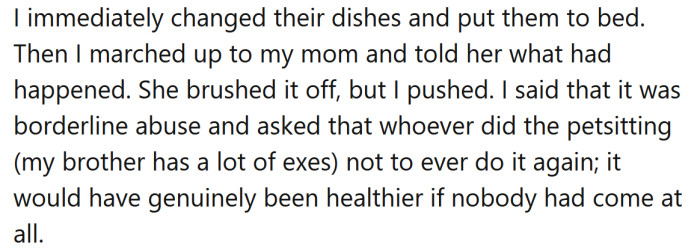
She got angry and said the OP was being "closed-minded."

The Importance of Communication in Pet Care Arrangements
Open communication is crucial in establishing pet care arrangements. Research from the University of California, Davis, emphasizes that discussing expectations and responsibilities with petsitters can mitigate misunderstandings and foster accountability.
Encouraging clear dialogue about the pet's needs can help ensure that both parties are on the same page, reducing the likelihood of future conflicts.
The Importance of Communication
Effective communication is essential for resolving conflicts related to pet care responsibilities.
Psychologists recommend that using clear and direct communication can prevent misunderstandings and promote collaboration.
For instance, discussing expectations about pet care upfront can mitigate feelings of resentment and frustration.
Now the OP is wondering if she should give the sitter another chance.

Here's how people reacted.
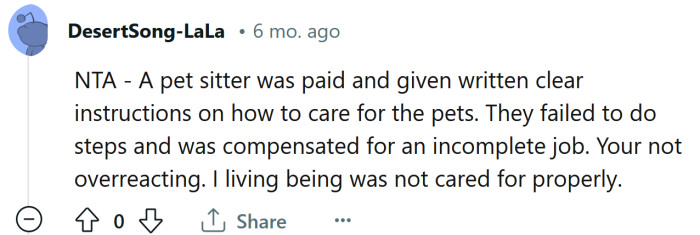
Sounds like mom made her up!
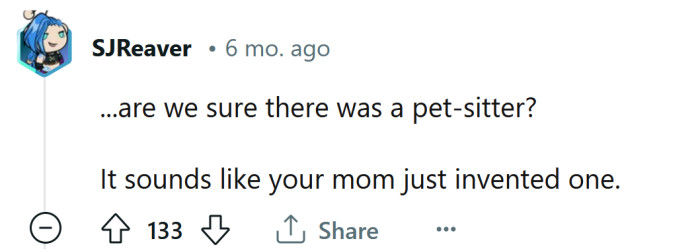
Establishing clear guidelines around pet care responsibilities is essential in preventing disputes. According to findings from the Journal of Veterinary Behavior, pet owners who set explicit expectations regarding care tend to experience fewer conflicts and greater satisfaction.
Creating a written agreement detailing responsibilities can enhance accountability and trust between pet owners and caregivers.
Establishing clear boundaries around responsibilities can also help couples manage conflicts related to pet care.
Research indicates that couples who clearly define their roles in pet care tend to experience less conflict and greater satisfaction.
This process can involve open dialogues about each partner's strengths and preferences in caring for pets.
NTA.

Hire a real sitter next time.

"You should be more responsible next time."
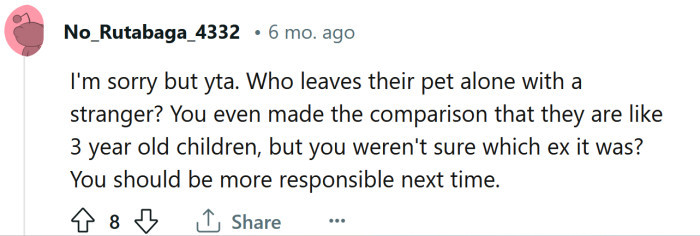
Navigating Emotional Responses to Pet Care Conflicts
Emotional responses to conflicts regarding pet care can be intense, especially when trust is broken. Research from the Human-Animal Bond Research Institute indicates that the emotional connection between humans and their pets can amplify reactions to perceived neglect.
Understanding the emotional stakes involved can help individuals approach these discussions with empathy and understanding, leading to more constructive outcomes.
Collaborative Problem Solving
Collaborative problem-solving is a key strategy for addressing conflicts in relationships.
Psychologists emphasize that working together to find solutions can enhance communication and strengthen relationships.
Engaging in discussions about pet care responsibilities can foster collaboration and build a stronger partnership.
It's not hard.
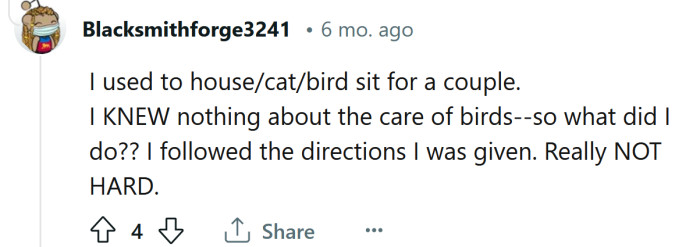
She screwed up!

YTA.

"You're not overreacting."

Fire her immediately!

"It wasn't petsitting."

What are your thoughts on this situation? Do you think the OP overreacted, or are her feelings understandable?
Either way, it doesn't seem that the petsitter did much petsitting at all. Those poor birds were essentially left to their own devices for two days.
We would love to hear your opinions on this. You can share your thoughts with us in the comment section.
Psychological Analysis
This situation underscores the complexities of caregiving dynamics in relationships.
When expectations surrounding pet care are unmet, it can lead to significant emotional distress. Encouraging open discussions about responsibilities can help individuals find a balance that respects both partners' feelings.
Analysis generated by AI
Analysis & Alternative Approaches
Clinical psychologists stress the importance of addressing caregiving responsibilities in relationships.
According to studies in family dynamics, fostering clear communication and defined roles can lead to healthier partnerships.
Ultimately, approaching conflicts with empathy and collaboration can enhance satisfaction for both partners and their pets.
Psychological Analysis
This situation highlights the complexities of trust in relationships, particularly when it involves the care of pets. Open communication and clear expectations are essential in preventing misunderstandings and fostering accountability.
Analysis generated by AI
Analysis & Alternative Approaches
Ultimately, navigating conflicts over pet care requires a careful balance of trust, communication, and empathy. By addressing concerns openly and establishing clear expectations, individuals can foster healthier relationships with those they rely on for support. Understanding the emotional context of these disputes can also enhance the dialogue and lead to more positive outcomes.



